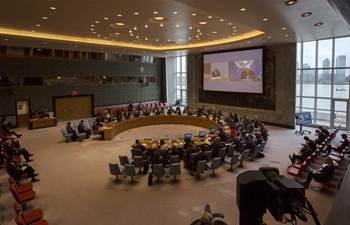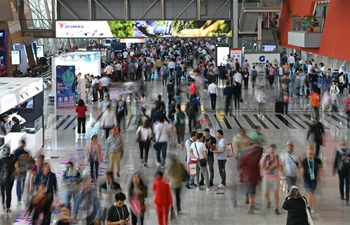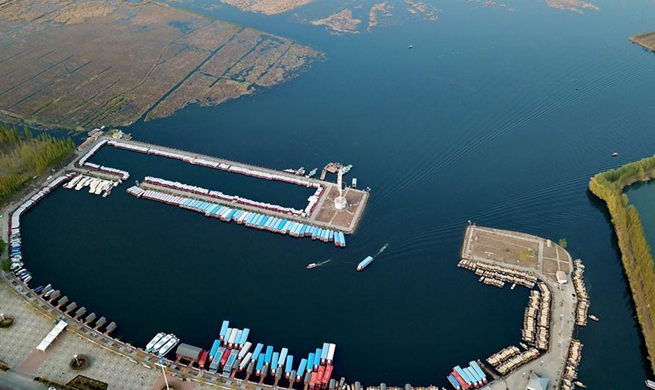by Murad Abdo
ADEN, Yemen, April 16 (Xinhua) -- The chances to implement a much-delayed pullback of Yemeni warring forces from the strategic Red Sea port city of Hodeidah are dwindling away gradually as internal fighting continues in escalation.
On Monday, the United Nations Special Envoy to Yemen Martin Griffiths said that the warring parties in Yemen had finally accepted the terms for a redeployment of forces in Hodeidah.
"Both parties have now accepted the detailed redeployment plan for phase one," Griffiths told the UN Security Council via video link from Amman, adding that "it has taken longer than we hoped, but we are grateful that it has happened at all."
The redeployment of forces was agreed in December last year under a cease-fire deal reached in Stockholm of Sweden that offered the best hope in years of moving toward an end to the war.
However, hours after the UN envoy's announcement, intense fighting between the Yemeni government forces and the Houthi rebels resumed heavily amid explosions that rocked the city early on Tuesday.
The two-warring sides exchanged heavy artillery shelling during the armed confrontations that flared up near the Red Sea Mills, the 50th Street and in other north-eastern parts of Hodeidah.
One resident based in Hodeidah confirmed to Xinhua that "fighting is continuing to escalate particularly during these days and the exchange of artillery bombardment is occurring sporadically every day."
"The exchange of random artillery shells and mortars forced many families in Hodeidah to flee their homes during the past days because they were besieged in a dangerous situation," he said on condition of anonymity.
The Houthi-affiliated Masirah television network reported that heavy artillery shelling was launched by the Saudi-backed Yemeni government forces against the airport of Hodeidah amid warplanes hovering over the city's airspace.
On the other side, sources of the pro-government Giants Brigades blamed the Iranian-backed Houthi rebels of targeting their military positions with an artillery bombardment.
Pro-government military sites in various areas of Hodeidah and particularly in Durayhmi district south of the city were subjected to randomly-fired Houthi shells in the early hours of Tuesday, causing no casualties, according to the sources.
In response to the UN envoy announcement, the Saudi-backed Yemeni government stated that "no progress has been made so far in implementing Stockholm Agreement though more than four months have passed because of Houthi militia's intransigence and foot-dragging approach."
Abdullah Assa'di, Yemen's permanent representative to the UN, has made this clear on Monday as he was delivering his speech during a session held by the UN Security Council about Yemen, according to the state-run Saba news agency.
Yemen's representative said that his government spared no effort to reach peace through many cycles of dialogue, but the armed Houthi rebels, supported by Iran, rejected what was agreed in Stockholm more than four months ago.
Griffiths said he had received assurances from Houthi leader Abdul-Malik al Houthi when they met in Sanaa last week that his forces would support the Hodeidah agreement, but Griffiths expressed a sense of caution as many delays had occurred.
"It is not an easy decision for the parties to take and I don't take their commitment lightly. Of course, it is taking longer than we had hoped but that it should happen at all is extremely welcome," Griffiths said.
Yemeni observers said that "hopes of the UN envoy exposed during the UNSC session may can't be achieved and may be crushed with the unstable situation on the ground."
For Ali Hadi, a military expert based in Aden, "many previous attempts to implement the provisions of the Stockholm Agreement failed and no withdrawal will occur as fighting is still taking place in the city."
"Withdrawal of warring troops remains as unachievable dreams because the situation on-ground is escalating day by day in complete negligence to the UN efforts aimed at achieving peace," he said.
The Iran-allied Houthi rebels control the Hodeidah city while the Saudi-backed government troops have advanced to the southeastern outskirts.
Hodeidah is the key lifeline entry point for the country's most food imports and humanitarian aid. The ongoing internal military conflict grinding into its fifth year has pushed over 20 million people to the verge of starvation.
Yemeni warring parties reached a peace deal on Hodeidah in December last year as a first step toward brokering a comprehensive political solution.
Sporadic breaches are daily recorded in Hodeidah as the two belligerent sides failed to withdraw their forces in accordance with an agreement reached in the Swedish capital Stockholm.

















